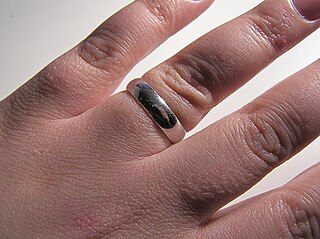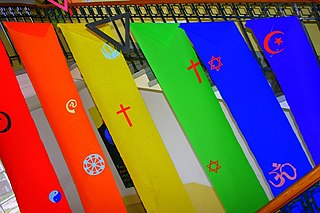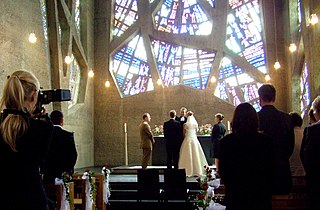Related Research Articles

A wedding is a ceremony where two people are united in marriage. Wedding traditions and customs vary greatly between cultures, ethnic groups, races, religions, denominations, countries, social classes, and sexual orientations. Most wedding ceremonies involve an exchange of marriage vows by a couple, presentation of a gift, and a public proclamation of marriage by an authority figure or celebrant. Special wedding garments are often worn, and the ceremony is sometimes followed by a wedding reception. Music, poetry, prayers, or readings from religious texts or literature are also commonly incorporated into the ceremony, as well as superstitious customs.
A white wedding is a traditional formal or semi-formal wedding originating in Great Britain.

An engagement or betrothal is the period of time between the declaration of acceptance of a marriage proposal and the marriage itself. During this period, a couple is said to be fiancés, betrothed,intended, affianced, engaged to be married, or simply engaged. Future brides and grooms may be called fiancée (feminine) or fiancé (masculine), the betrothed, a wife-to-be or husband-to-be, respectively. The duration of the courtship varies vastly, and is largely dependent on cultural norms or upon the agreement of the parties involved.
The banns of marriage, commonly known simply as the "banns" or "bans", are the public announcement in a Christian parish church, or in the town council, of an impending marriage between two specified persons. It is commonly associated with the Catholic Church, the Church of Sweden (Lutheran), the Church of England (Anglican), and with other Christian denominations whose traditions are similar. In 1983, the Catholic Church removed the requirement for banns and left it to individual national bishops' conferences to decide whether to continue the practice, but in most Catholic countries the banns are still published.

A wedding ring or wedding band is a finger ring that indicates that its wearer is married. It is usually forged from metal, traditionally gold or another precious metal. Rings were used in ancient Rome during marriage.
Maundy Thursday or Holy Thursday, among other names, is the day during Holy Week that commemorates the Washing of the Feet (Maundy) and Last Supper of Jesus Christ with the Apostles, as described in the canonical gospels.

In Christian denominations that practice infant baptism, confirmation is seen as the sealing of the covenant created in baptism. Those being confirmed are known as confirmands. For adults, it is an affirmation of belief. It involves laying on of hands.

In denominations of Christianity, a godparent or sponsor is someone who bears witness to a child's baptism (christening) and later is willing to help in their catechesis, as well as their lifelong spiritual formation. In the past, in some countries, the role carried some legal obligations as well as religious responsibilities. In both religious and civil views, a godparent tends to be an individual chosen by the parents to take an interest in the child's upbringing and personal development, to offer mentorship or claim legal guardianship of the child if anything should happen to the parents. A male godparent is a godfather, and a female godparent is a godmother. The child is a godchild.
The Confessing Movement is a largely lay-led theologically conservative Christian movement that opposes the influence of theological liberalism and theological progressivism currently within several mainline Protestant denominations and seeks to return them to its view of orthodox doctrine, or form a new denomination and disfellowship (excommunicate) them if the situation becomes untenable. Those who eventually deem dealing with theological liberalism and theological progressivism within their churches and denominations as not being tenable anymore would later join or start Confessional Churches and/or Evangelical Churches that continue with the traditions of their respective denominations and maintaining orthodox doctrine while being ecclesiastically separate from the Mainline Protestant denominations.

Marriage vows are promises each partner in a couple makes to the other during a wedding ceremony based upon Western Christian norms. They are not universal to marriage and not necessary in most legal jurisdictions. They are not even universal within Christian marriage, as Eastern Christians do not have marriage vows in their traditional wedding ceremonies.

The blessing or wedding of same-sex marriages and same-sex unions is an issue about which leaders of Christian churches are in ongoing disagreement. Traditionally, Christianity teaches that homosexual acts are sinful and that holy matrimony can only exist between two persons of different sexes. These disagreements are primarily centred on the interpretation of various scripture passages related to homosexuality, sacred tradition, and in some churches on varying understandings of homosexuality in terms of psychology, genetics and other scientific data. While numerous church bodies have widely varying practices and teachings, individual Christians of every major tradition are involved in practical (orthopraxy) discussions about how to respond to the issue.
Interfaith marriage, sometimes called interreligious marriage or "mixed marriage", is marriage between spouses professing different religions. Although interfaith marriages are often established as civil marriages, in some instances they may be established as a religious marriage. This depends on religious doctrine of each of the two parties' religions; some prohibit interfaith marriage, and among others there are varying degrees of permissibility.

Humanist Society Scotland is a Scottish registered charity that promotes humanist views and offers humanist wedding, funeral, and baby-naming ceremonies. It is a member of the European Humanist Federation and Humanists International.

The legal status of same-sex marriage has changed in recent years in numerous jurisdictions around the world. The current trends and consensus of political authorities and religions throughout the world are summarized in this article.

In Australia, celebrants or civil celebrants are people who conduct formal ceremonies in the community, particularly weddings – which represent the main ceremony of legal import conducted by celebrants –, and for this reason are often referred to as marriage celebrants. They may also conduct extra-legal ceremonies such as naming of babies, renewal of wedding vows, funerals, divorces, becoming a teenager, changing name, significant birthdays, retirements, and other life milestones. Officiating at a marriage requires that the celebrant be an authorised marriage celebrant under Australian law, or the law where the marriage takes place, but officiating at non-legal ceremonies does not.

Lesbian, gay, bisexual, transgender and queer (LGBTQ+)-affirming religious groups are religious groups that welcome LGBT people as their members, do not consider homosexuality as a sin or negative, and affirm LGBT rights and relationships. They include entire religious denominations, as well as individual congregations and places of worship. Some groups are mainly composed of non-LGBTQ+ members and they also have specific programs to welcome LGBTQ+ people into them, while other groups are mainly composed of LGBTQ+ members.

A marriage officiant or marriage celebrant is a person who officiates at a wedding ceremony.
Methodist viewpoints concerning homosexuality are diverse because there is no one denomination which represents all Methodists. The World Methodist Council, which represents most Methodist denominations, has no official statements regarding sexuality. British Methodism holds a variety of views, and permits ministers to bless same-gender marriages. United Methodism, which covers the United States, the Philippines, parts of Africa, and parts of Europe, concentrates on the position that the same-sex relations are incompatible with "Christian teaching", but extends ministry to persons of a homosexual orientation, holding that all individuals are of sacred worth.
References
- ↑ "Renewal of Marriage Vows and Affirmation of a Marriage" (PDF). Augsburg Fortress. 2006. Retrieved 28 September 2019.
- ↑ "Renewal of Wedding Vows". Newcastle Anglican Church. 20 June 2017. Retrieved 28 September 2019.
- ↑ Otnes, C. and Pleck, E. H., Cinderella Dreams: The Allure of the Lavish Wedding, 2003, University of California Press, page 254
- ↑ Blum, M. and Kaiser, L. F., Wedding Planning for Dummies, 2005, Wiley Publishing
- ↑ "Renewing your vows". Your church wedding. Church of England. Retrieved 26 September 2016.
- ↑ "Renew your marriage vows". Leeds.gov.uk. Leeds City Council. Retrieved 26 September 2016.
- ↑ "Everything you need to know about humanist wedding vow renewal ceremonies". Humanist Ceremonies Wedding Blog. Humanists UK. 19 August 2020. Retrieved 24 August 2020.
- ↑ "Re-Affirmation of Marriage Vows at United Methodist Church". Cape May County Herald. 19 January 2012. Retrieved 28 September 2019.
- ↑ City vows to renew vows for 1,000 couples, Pittsburgh Post-Gazette , June 13, 2007
- ↑ Staff Report (4 February 2010). "Miami breaks world record for wedding vow renewals". Hamilton Journal News. Retrieved 13 June 2011.
- ↑ Bennett, Madison (October 8, 2016). "World record set in Kalamazoo for most marriage-vow renewals". Kalamazoo Gazette . Retrieved October 10, 2016.